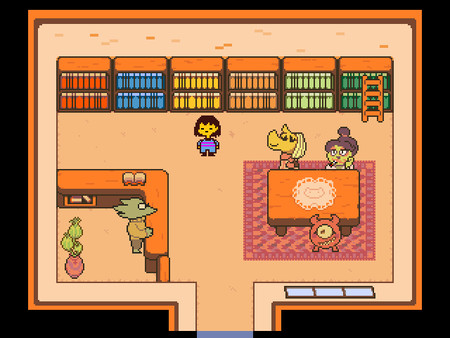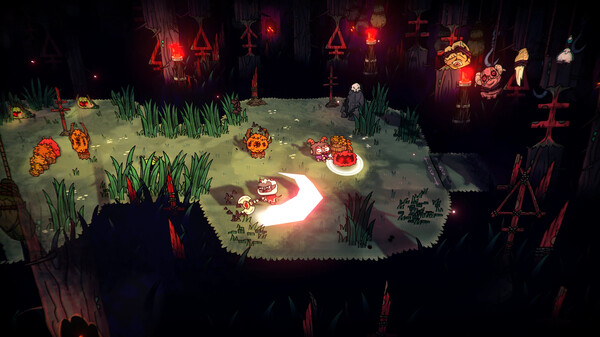The interesting case of choice in video games part 1
Photo taken by FOX ^.ᆽ.^= ∫ from LINK
A lot of players love games in which they have a choice. Even if the choice is simple: be a villain or a hero, be violent or a pacifist. It isn’t required for the game to have multiple endings and outcomes based on every single choice to be interesting. The fascinating thing here is how players think and what the game does with their choice. How the game values it and how sometimes it punishes the player for it.
This article will have bigger or smaller spoilers to games like: Undertale, Cult of the Lamb, Detroit: Become Human, Cold Front, Slay the Princess, Mouthwashing. Please, proceed with caution. This article is also the author’s personal opinion based on what they saw in fandoms and played themselves.

SOURCE: Steam: LINK
First, let me just present to you the idea of this article a bit better. There are various choices in games. Some are just small choices that the player can make during the game, for example, they can water the plants. They don’t have to; it’s just one of many options. There are no repercussions if the player doesn’t do it. Then we have endings that are based on our in-game choices. Starting with simple ones – either have a happy end or a bad end, then proceeding with more complicated ones – multiple ways of achieving some form of an ending to the story. Sometimes we don’t know until the end that our choices did, in fact, matter. Some games play with the morality of the player – sometimes just a simple choice of killing or saving not-so-important character can be a key to having a good ending.
And how it is with those „good endings”? Do they really matter? Statistically speaking, most players want to reach a good ending – or something similar – during their first playthrough of the game. Why? The answer is very simple: good ending means figuring out the plot, right? Not necessarily, not always. Sometimes we need to play through worse endings to discover the whole plot too, or to get to know the characters better. For example, in The Quarry by Supermassive Games we get to know the personalities of characters and are getting more invested in relationships between them if we go with the choices that we would not call the best.
Most of the time, the choices we are given in games serve a purpose. Whether it’s storytelling, entertainment or to making the player think a bit.
Now, let me focus on a few games that are quite interesting examples of this having choice issue (or no, as you will see later). In this segment I want you to see how different choice systems we can have in games, and how players can look at those in various ways as well.
To begin with, Undertale, an indie game created by Toby Fox. With this one, I will not focus on the plot of the game, but the basic idea is to get out of underground that is full of monsters. You play as a human child. In the game you can choose the pacifist route, genocide route or something in between. On the pacifist route you must not kill anything. Genocide is the opposite of that and something in between is just doing whatever you want – for example, killing some minor monsters but leaving main characters without a scratch. The interesting thing here is that the game punishes the player for their choices. If you play pacifist, the game gets more violent, harder to clear it without committing to murder. Each boss, each opponent gets tougher and tougher. If you play genocide route up till last stage it’s pretty easy, but the last boss fight is a pure nightmare. It’s so hellish that the fight is avaiable on the Internet to just play as a challenge.
But of course that couldn’t be all there is to it, right? The game also puts mental pressure on you. It shows through the plot, through many sad dialogues that your choices have consequences. Characters comment on it, making you feel even worse for your every choice.
So on the one hand, the game kind of pushes you to kill – at first you may not even know it’s a choice not to do so. Then it gives everything it has to show you that this was a mistake.

SOURCE: Steam LINK
The second game I want to focus on is Cult of the Lamb by Massive Monster, in which you literally have a cult. That in itself is a pretty controversial topic. The plot is about revenge. Sounds quite violent from the start, doesn’t it? Yet through the whole playthrough the game gives you choices – you choose doctrines for your followers. They vary through „they can eat grass and not get sick” to „cannibalism is okay”. You choose rituals like „ascend your follower” or „sacrifice”. Of course, you can play the game as a good shepherd, keeping your sheep protected.
However, then the game gives you another choice, and that is a hard choice for every collector player – if you want to collect all of the achievements you have to kill one NPC in the game. This is a character that has been with you since the beginning. That by its own is already a hard choice, because you may grow attached to this character. It gets better. If you do decide to kill them – you can find a note from them. Where they call the Lamb their kid and are very proud of them. The game punishes you for this choice, getting into your guilty conscience.
That’s not all there is to it. Even if you want to play the game as peacefully as possible, it pushes you to violence anyway. After you are done with the plot, you can unlock all the rituals and doctrines you have missed. So you will have those bad options anyway too. Seems like you can’t escape this violence and your choices didn’t really matter anyway.
Photos taken from STEAM
🎮 Anna Kubacik, absolwentka kierunku Języki obce w mediach i biznesie, studia licencjackie,
2024/2025, Akademia Nauk Stosowanych w Koninie
